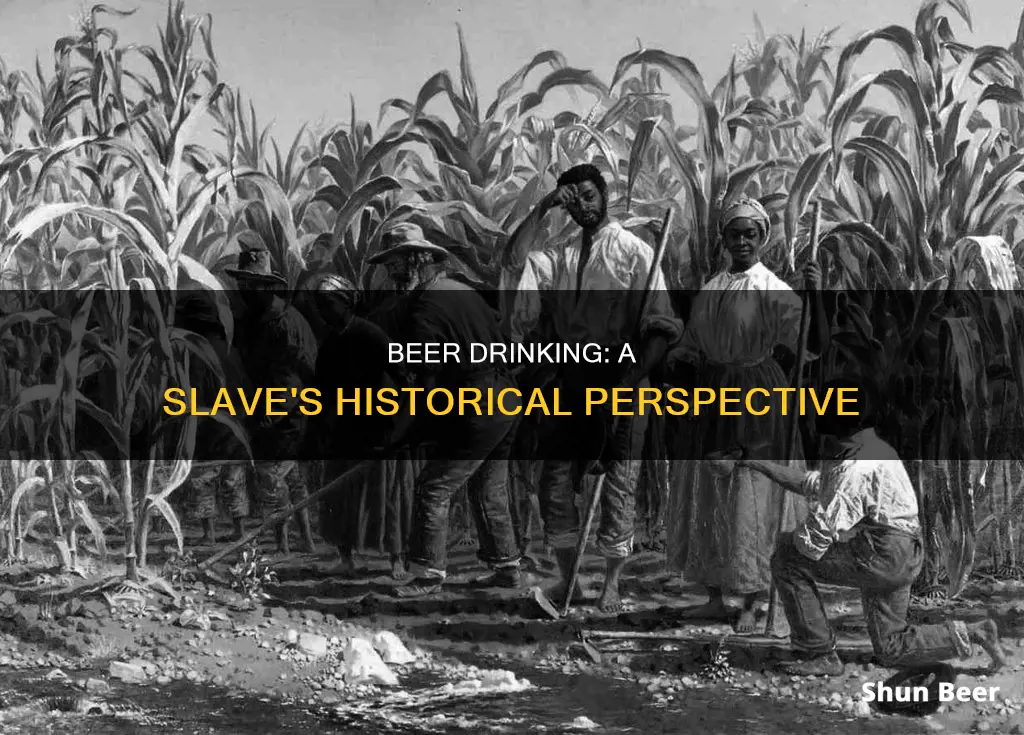
Alcohol was used as a tool for control by slave owners, with slaves often encouraged to binge drink during holidays and celebrations. While alcohol was forbidden on many plantations, it was also used as a reward for hard work and slaves were very familiar with the brewing process, often stealing alcohol for their own secret parties. In Virginia, slaves and indentured servants played a vital role in growing hops and brewing beer, with slaves often doing the hands-on brewing.
| Characteristics | Values |
|---|---|
| Alcohol consumption by slaves | Alcohol was forbidden to slaves on plantations but was consumed on special occasions, holidays, and during work. |
| Slave owners' opinions on alcohol consumption by slaves | Slave owners used alcohol as a tool for control and to justify slavery. |
| Slave access to alcohol | Slaves could obtain alcohol through theft, the black market, or by brewing it themselves. |
| Slave involvement in alcohol production | Slaves were involved in brewing beer and cider, and growing hops. |
What You'll Learn
- Slaves' access to alcohol was used as a form of control by slave owners
- Alcohol was used as a tool of manipulation and social control during the annual Christmas holidays
- Slaves were often involved in the brewing process and had access to alcohol through theft
- Slaves could obtain alcohol through a black market
- Beer was discovered in present-day Egypt around 12,000 years ago

Slaves' access to alcohol was used as a form of control by slave owners
While slaves were not always allowed alcohol, it was often used as a tool for control by slave owners. Alcohol was forbidden to slaves on most plantations, but this rule was frequently broken. On some occasions, masters would supply their slaves with alcohol themselves, especially during holidays and special events such as weddings. This was done to create a sense of paternalism and to give the slaves a false sense of freedom. Slave owners would also supply slaves with alcohol to increase productivity in the fields and as a reward for working hard.
Slaves also had access to alcohol outside of the occasions sanctioned by their masters. Female slaves who worked in the house would steal alcohol or intentionally forget to lock it away so that other slaves could take it. They would then drink it at secret parties, often in abandoned buildings or in the woods. Slaves also had access to alcohol through the black market, which was a part of the underground economy surrounding slavery.
Alcohol was also used as a means of acquiring slaves. In West Africa, it is estimated that alcohol imports accounted for 5 to 10% of the region's overall export slave trade. Alcohol was also used to secure the safe passage of caravans and to facilitate trade negotiations for captives.
Drinking Beer on Amtrak: What's Allowed?
You may want to see also

Alcohol was used as a tool of manipulation and social control during the annual Christmas holidays
During the Christmas holidays, slaves were given time off from their regular work and were allowed to do as they pleased. For many, this meant participating in sports, dancing, and drinking whiskey. While slaves were given freedom during the holidays, the provision of alcohol was often a manipulative tactic employed by slave owners to prevent insurrection and reinforce the idea that slaves were not fit for freedom.
Slave owners would encourage their slaves to drink to excess, often through competitions and bets, creating a perception that slaves would take advantage of freedom if given to them. This served the ulterior motive of appeasing those who yearned for freedom while also reinforcing the idea that slaves were not capable of handling liberty responsibly. The holidays became a safety valve to carry off the rebellious spirit of enslaved humanity.
The provision of alcohol during the Christmas holidays was part of a larger pattern of using food and drink as a weapon of control by slave owners. By providing alcoholic beverages, they created an illusion of freedom while simultaneously reinforcing the power dynamics of slavery. This manipulation extended beyond the holidays, with alcohol sometimes being used as a reward for working hard or to increase energy and productivity.
The annual Christmas holidays thus became a period of respite that was strategically granted by slave owners to maintain control and prevent rebellion. The provision of alcohol during this time was a tool to manipulate the perception of freedom and reinforce the social control of slavery.
Beer and Penicillin: A Risky Mix?
You may want to see also

Slaves were often involved in the brewing process and had access to alcohol through theft
While slaves were forbidden from drinking alcohol, they were often involved in the brewing process and had access to alcohol through theft. On some plantations, brewing cider, beer, and brandy was part of the duties of female house slaves. This meant that slaves were very familiar with the brewing process and knew where the alcohol was stored.
Theft for parties was common, and alcohol was a significant part of these festivities. Female slaves would either directly steal the alcohol or "forget" to lock it up so another slave could take it. They would then drink the alcohol at secret parties, often in the woods or abandoned buildings.
Slaves also had access to alcohol through the black market, which was part of the underground economy surrounding slavery. There were even some bars and public houses that served slaves.
In addition to theft and the black market, slave owners or overseers would sometimes pass out liquor during regular days to increase productivity. On some occasions, a "little brown jug" was "passed 'round" to warm the slaves and give them more energy while they worked in the fields. Sometimes, a sip of hard liquor was given as a reward for working hard.
Beer and Aspirin: Safe Mix or Health Risk?
You may want to see also

Slaves could obtain alcohol through a black market
While slaves were generally forbidden from drinking alcohol, they could obtain it through a black market. This underground economy was not recorded officially, but slaves could buy alcohol if they desired. There were even some bars and pubs that served slaves.
Slaves could earn money to spend on the black market in several ways. Some slaves had their own small plots where they could grow crops to sell for cash. Occasionally, a slave owner might pay their slaves with money. In rare instances, slave owners allowed slaves to rent themselves out, with most of the money going to the slave owner but some to the slave. Some slaves were also able to trade for goods to barter with.
On some plantations, brewing cider, beer, and brandy was part of the duties of female house slaves. These slaves were familiar with the brewing process and knew where the alcohol was stored, so theft was common. Slaves would drink the stolen alcohol at secret parties, often in the woods or abandoned buildings.
Beer Drinking and Liver Cirrhosis: What's the Link?
You may want to see also

Beer was discovered in present-day Egypt around 12,000 years ago
Ancient Egyptians produced and consumed beer in huge volumes, and it was so essential that it was treated principally as a type of food. It was consumed daily and played an important role in religious festivals and celebrations. For example, labourers who built the pyramids of Giza received a daily ration of over 10 pints of beer. Beer also had divine status, with several Egyptian gods and goddesses associated with it, such as Hathor, the goddess of love, dance, and beauty, who was also known as 'The Lady of Drunkenness'.
Beer was also used for ritual purposes and played a significant role in the development of a complex Egyptian society. For instance, excavations have revealed that beer was used in ritual activities at elite cemeteries. It was considered a symbol of status and authority, important for elite feasting and burial rituals.
The process of making ancient Egyptian beer differed from modern brewing techniques. Ancient Egyptians used a two-stage mash process, combining a cold mash and a hot mash, which were then left to ferment in a ceramic vessel. The ceramic vessel's porous interior provided an ideal surface for the wild yeast culture to grow, and its cooler temperature was advantageous in the hot, arid climate. The beer was consumed directly from the ceramic vessel using clay straws, which prevented the consumption of sediment and maintained hygiene as multiple people drank from the same container.
The ancient Egyptian beer had a thick, porridge-like consistency and was likely low in alcohol content. It was brewed from wheat, barley, and grass. While it lacked hops, which were not used until the medieval period, it may have been flavoured with dates, pomegranates, and indigenous herbs.
Kayaking and Beer: A Fun, Safe Lake Erie Adventure
You may want to see also
Frequently asked questions
Yes, slaves did get to drink beer, but it was not a common occurrence. Beer was usually forbidden to slaves, but there were several instances where this rule was broken. On some plantations, beer was a common feature, and it was supplied by the master on special occasions such as Christmas and weddings. Slaves also obtained alcohol through theft and the black market.
Yes, slaves were involved in brewing beer, particularly in Virginia. They were responsible for the hands-on brewing process, while the planters' wives often had a supervisory role. Slaves also grew hops, a key ingredient in brewing beer.
Yes, slaves drank other types of alcohol, including whiskey, cider, and brandy. Alcohol was used as a form of social control by slave owners, who encouraged excessive drinking during holidays and special occasions. This was done to provide "proof" that slaves did not deserve freedom and to discourage thoughts of escaping.







